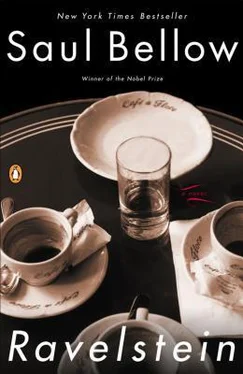"Maybe an unexamined life is not worth living. But a man's examined life can make him wish he was dead" was what I said to him.
Ravelstein was overjoyed. He laughed so hard his eyes turned up to heaven.
But I'm not done yet with Paris in the Spring.
The gorgeous jacket at Lanvin was beautiful flannel, silky as well as substantial. The color was one I associated with Labrador retrievers-golden, with rich lights among the folds. "You see such jackets advertised in _Vanity Fair__ and the other fashion slicks, and they're usually modeled by unshaven toughs with the look of rough trade or of downright rapists who have nothing-but nothing-to do, other than being seen in all the glory of their dirty narcissism." You don't even think of such a garment on an unwieldy intelligent man. A little fat in the chest, maybe, or with lover's handles at the waist. It's actually a pleasant thing to see.
I advised Ravelstein to buy this Lanvin jacket.
The price was $4,500 and he put it on his Visa Gold card because he wasn't sure offhand about his balance at the Crйdit Lyonnais. Visa protects you from gouging; it guarantees you the legal rate of exchange for the day of the transaction.
In the street he asked how the color held up in full daylight. He was deeply satisfied when I said it was gorgeous.
Our next stop was Sulka's, where he looked over the custom-made shirts he had ordered. They were to be delivered to the Crillon, each one in a durable plastic box. We then went to the Lalique showrooms, where he wanted to look at lighting fixtures for his walls and ceilings at home.
"Let's set aside half an hour for Gelot the hatmaker."
At Gelot's I broke down and bought myself a green corduroy fedora. Abe said I had to have it. "I like the look of it on you. You can do with a little assertion. You don't make enough of yourself," he said. "You're too fucking modest, Chick. It's unbecoming because anybody who catches your eye sees that you're an overweening megalomaniac. If you're too stingy to do it I'll put it on my account…."
"My parents had green sofas at home," I said. "Secondhand, but velvet. I'll pay for it myself…. I'm buying this for old times' sake."
"It may be too heavy for June."
"Well, I expect to be still alive in October."
He was wearing his new Lanvin jacket on the rue de Rivoli. The great Louvre and the parks were on our left. The arcades were full of tourists.
"The Palais Royal"-Ravelstein gestured loosely toward it-"was where Diderot walked late every afternoon and where he had his famous conversations with Rameau's nephew." But Ravelstein was by no means like the nephew-that music teacher and sponger. He was above Diderot, too. A much larger and graver person with an extensive training in history, especially the history of moral and political theory. I was always drawn to people who were orderly in a large sense and had mapped out the world and made it coherent. Ravelstein only sounded incoherent with his "thee-ah thee-ah" s. We had a buddy back in the States who liked to tell us, "Order itself is charismatic." Which is another way of saying "Music hath charms" et cetera.
And we happened just then to be talking about this charisma-man whose name is, or was, Rakhmiel Kogon. Rakhmiel was a dead ringer for the actor Edmund Gwenn, who played a Macy's Santa Claus in _Miracle on 34th Street__. But Rakhmiel was a non-benevolent Santa Claus, a dangerous person, ruddy, with a red-eyed scowl and a face in which the anger muscles were highly developed. He came down the chimney like Santa Claus, but his aim was to make trouble.
Ravelstein and I had no need for lunch-the Lucas-Carton ten-course banquet took away your appetite till dinnertime next day-but we sat down to drink some coffee. Ravelstein was on his second packet of Marlboro cigarettes, and at the Cafй de Flore, which he patronized regularly, he ordered "_un espresso trйs serrй.__" At the Flore they packed it tight for him. But if his big fingers shook when he picked up the cup it was not because he had a case of nerves. What he had was an overflow of excitement. The caffeine was the least of it.
He said, "Rakhmiel was one of my teachers, early on. Then he taught at the London School of Economics. Then at Oxford, where he turned British. Always divided his time between the U. S. and England. He's a serious person, not comfortable with himself. But I do owe him a lot-like my present position. I was in exile in Mi nesota and he got me the appointment I wanted…"
"_Almost__ what you wanted…"
"That's true. I'm the only one with rank who doesn't have a name chair. After all I've done for the university… And the only chair the administration offers me is the electric chair."
But Ravelstein was unusually free from such preoccupations and grievances. And this is not the place for them. I may return to this subject later. I probably won't. Anyway, it isn't what I should be presenting here. I _said__ I'd take a piecemeal approach to Ravelstein.
He was a curious man to watch at the table. His feeding habits needed getting used to. Mrs. Glyph, the wife of the founder of his department, told him once that he must never again expect her to ask him to dinner. She was in her own right a very rich lady, big on high culture and an entertainer of visiting celebrities. She had had R. H. Tawney at her dinner table, and Bertrand Russell, and some big-shot French Thomist whose name escapes me (Maritain?), and lots of literati, especially the French. Abe Ravelstein, then a junior faculty member, was invited to a luncheon to honor T. S. Eliot. Maria Glyph said to Abe Ravelstein as he was leaving, "You drank from your Coke bottle, and T. S. Eliot was watching-with horror."
Ravelstein told this on himself. And on the late Mrs. Glyph. She was born to huge wealth, her husband was a great orientalist. "People who are self-glamorized invent their peculiar significance as they go along," Ravelstein said. "Until they knit together a dazzling fantasy. They turn themselves into something like glorious dragonflies and whiz through an atmosphere of perfect unreality. Then they write essays, poems, whole books about each other…"
"Crude Jewish behavior at a lunch for a nob-a superimportant visitor…," I said.
"And what will T. S. think of us!"
But somehow I can't believe that drinking from a Coke bottle was the whole story. (And what, to begin with, was a Coke bottle doing on the table!) Faculty wives knew that when Ravelstein came to dinner they would face a big cleaning job afterward-the spilling, splashing, crumbling, the nastiness of his napkin after he had used it, the pieces of cooked meat scattered under the table, the wine sprayed out when he laughed at a wisecrack; courses rejected after one bite and pawed to the floor. An experienced hostess would have spread newspapers under his chair. He wouldn't have minded. He didn't pay much attention to such things. Of course each of us has ways of knowing what is going on. Abe _knew__-he knew what to bring to full consciousness and what to brush aside. Objecting to Abe's table manners would be a confession of pettiness.
It amused Ravelstein to say, "She wasn't going to let any kike behave so badly at _her__ table."
Professor Glyph, her husband, had no such prejudices. He was a tall, grave man. His manner was decorous but his real look seemed focused elsewhere, on objects more distant and even more amusing-more amusing than Ravelstein, I mean. His small eyes set wide apart were pleasant and tolerant; his hair, parted in the middle, was the hair of a learned gentleman, famous for his scholarship. His friends were mainly French, and prominent, with names like Bourbon-Sixte-either members of the Academy or short-listed for nomination. Glyph was pampered by his wife and her servants-a laundress, a cook, and a parlor maid. The Glyphs were no ordinary academic couple-they were at home in London as well as in Paris. In Saint-Tropez, or some such place, the Scott Fitzgeralds had been their close neighbors. Glyph and his wife were not your common name-droppers: They had been a rich American Jazz-Age couple. They had known Picasso and Gertrude Stein.
Читать дальше












